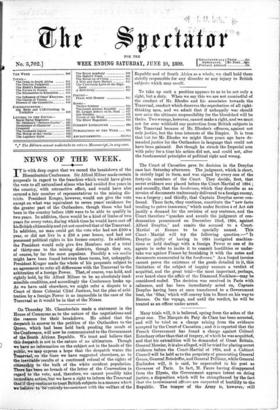The Court of Cessation gave its decision in the Dreyfus
case last Saturday afternoon. The judgment, which is short, is strictly legal in form, and was signed by every one of the forty-six members of the Court. They decide, first, that secret evidence was placed before the Court-Martial of 1894 ; and secondly, that the bordereau, which they describe as an invoice of documents traitorously delivered to a foreign enemy, was a forgery ; and thirdly, that Captain Dreyfus never con- fessed. These facts, they continue, constitute the "new facts tending to prbve innocence," which under Section 4 of Act 443 justify a demand for the revision of any sentence, and the Court therefore "'quashes and annuls the judgment of con- demnation pronounced on December 22nd, 1894, against Alfred Dreyfus," and remits the accused to a Court- Martial at Rennes to be specially named. This Court - Martial will try the following question :—" Is Dreyfus guilty of having in 1894 instigated machina- tions or held dealings with a foreign. Power or one of its agents in order to incite it to commit hostilities or under- take war against France by furnishing it with the notes and documents enumerated in the bordereau." As a forged invoice cannot prove the existence of the goods detailed in it, this limitation of the subject of inquiry ensures a verdict of acquittal, and the great trial—the most important, perhaps, ever heard since the affair of the Diamond Necklace—may be considered ended. The decision was received in Paris with calmness, and has been immediately acted on, Captain Dreyfus having been at once transferred to a Government boat, the Sfax,' which will convey him to Brest on his way to Rennes. On the voyage, and until the verdict, he will be treated as an officer under arrest.






































